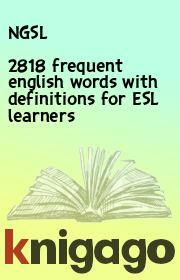NGSL - 2818 frequent english words with definitions for ESL learners
 | Название: | 2818 frequent english words with definitions for ESL learners |
Автор: | NGSL | |
Жанр: | Старинная литература | |
Изадано в серии: | неизвестно | |
Издательство: | неизвестно | |
Год издания: | - | |
ISBN: | неизвестно | |
Отзывы: | Комментировать | |
Рейтинг: | ||
Поделись книгой с друзьями! Помощь сайту: донат на оплату сервера | ||
Краткое содержание книги "2818 frequent english words with definitions for ESL learners"
NEW GENERAL SERVICE LIST PROJECT
the most important words for second language learners of English
a New General Service List (NGSL) of 2818 core high frequency vocabulary words for students of English as a second language, a major update of Michael West’s 1953 General Service List . First published in early 2013, the NGSL provides over 92% coverage for most general English texts (the highest of any corpus-derived general English word list to date).
Читаем онлайн "2818 frequent english words with definitions for ESL learners". Главная страница.
- 1
- 2
- 3
- . . .
- последняя (33) »
http://www.newgeneralservicelist.org/
NEW GENERAL SERVICE LIST PROJECT
the most important words for second language learners of English
a New General Service List (NGSL) of 2818 core high frequency vocabulary words for students of English as a second language, a major update of Michael West’s 1953 General Service List . First published in early 2013, the NGSL provides over 92% coverage for most general English texts (the highest of any corpus-derived general English word list to date).
a New General Service List (NGSL), one that is based on a carefully selected 273 million-word subsection of the 2 billion word Cambridge English Corpus (CEC)
1 - the,used to point to something already mentioned,
be,used to show the identity of a thing,
of,belonging to or connected with something,
and,used to join words or groups of words,
to,used to indicate place or direction,
a,something that is being considered,
in,used to indicate being inside of or surrounded by something else,
have,"to own, possess, or hold something",
it,a thing that has been previously mentioned,
you,used to refer to the person the speaker is addressing,
for,indicating the purpose or need of something,
not,used to make an expression negative,
that,"used to identify a specific person, thing, fact or idea",
on,touching and being supported or physically in contact by something,
with,used to express that people or things are together,
do,to perform an action or activity; to work on something,
as,used to refer to the same degree or amount,
he,used to refer to a male person that is the subject,
we,used to refer to the speaker and another person as the subject,
this,"used to identify a specific person, thing, or idea that is close",
at,"used to indicate place, location, or arrival",
they,"used to refer to two or more people, animals, or things",
but,used to contrast a statement with a to previous one,
from,indicating the starting point of motion or action ,
by,"close to or next to, up to and beyond, beside a place",
will,"expressing the future, to say something is expected to happen",
or,"used to link alternatives, to introduce another choice",
his,belonging to or relating to a male who has already been talked about,
say,to use your voice to express something with words,
go,to move or travel from one place to another,
she,used to refer to a female that is the subject,
so,to a degree that is suggested or stated,
all,"the whole, entire or total amount",
about,"on the subject of, or concerning something",
if,introducing a condition for something to happen,
one,"the number 1, a single person or thing",
my,belonging to or relating to the person who is speaking or writing,
know,"to have in your mind, be aware of something",
there,"in that place or position, at that location",
which,"what one or ones of a group, one or more people or things",
can,to be able to do something,
get,"to obtain, receive or be given something",
her,used to refer to a female who has already been talked about,
would,indicating someone thinking about what will happen,
think,to believe or have a particular idea,
like,to find something agreeable or enjoyable,
more,"greater in amount, number, or size",
their,belonging to or relating to a group that have already been talked about,
your,belonging or relating to the person or people you are talking to,
when,"at what time, at, in, during which, how soon",
what,asking for information about someone or something,
make,"to build, create, or produce something",
time,"something measured in minutes, hours, days, etc.",
who,"what or which person or people, to ask about, talking about",
see,to notice or become aware of with the eyes,
up,to move towards a high place from a lower one,
people,"human beings in general, plural of person",
some,used to refer to an unspecified amount or number,
out,in a direction or movement away from the inside or center,
me,the person who is speaking or writing,
good,of high quality,
other,used to mention a person or thing is different from already mentioned,
year,a unit of time equal to 12 months or 365 days,
well,"in a successful way, in a good or satisfactory way",
our,belonging to or relating to the person who is speaking and one or more other people,
very,to a high degree,
just,"exactly, to an exact degree or manner",
them,"a group of people, animals, or things that have already been talked about",
no,"not at all, in a way that shows a negative response",
take,"to carry or move with one's hands, to reach for",
because,for a reason,
come,"to move toward someone, to approach",
could,"used as the past tense of can, to indicate possibility",
use,to do something with another thing,
work,to have a job or activity involving mental or physical effort,
then,"at that time, at the time mentioned, after that",
now,at the present time or moment,
also,"in addition, too, in a similar way",
than,used to introduce a second part that is being compared,
him,someone male who has already been talked about,
into,introduce movement toward the inside of something,
only,alone in a class or category,
want,to desire or wish for,
look,to direct one's gaze in a particular direction,
these,plural form of THIS,
its,belonging to or relating to the thing that has already been talked about,
new,"not old, recently born, built or created",
give,to hand over or present something to another,
first,coming before
--">- 1
- 2
- 3
- . . .
- последняя (33) »


